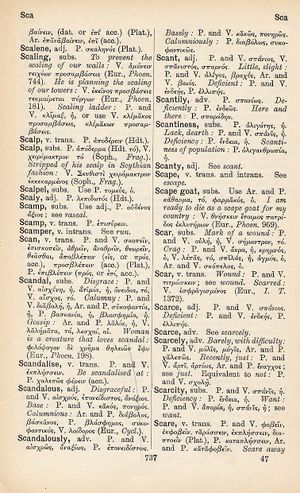scandal: Difference between revisions
From LSJ
ἀκίνδυνοι δ' ἀρεταὶ οὔτε παρ' ἀνδράσιν οὔτ' ἐν ναυσὶ κοίλαις τίμιαι → but excellence without danger is honored neither among men nor in hollow ships
(CSV5) |
m (Woodhouse1 replacement) |
||
| Line 1: | Line 1: | ||
{{Woodhouse1 | {{Woodhouse1 | ||
|Text=[[File:woodhouse_737.jpg|thumb|link={{filepath:woodhouse_737.jpg}}]] | |Text=[[File:woodhouse_737.jpg|thumb|link={{filepath:woodhouse_737.jpg}}]] | ||
===substantive=== | |||
[[disgrace]]: [[prose|P.]] and [[verse|V.]] [[αἰσχύνη]], ἡ, [[ἀτιμία]], ἡ, [[ὄνειδος]], τό, [[verse|V.]] [[αἶσχος]], τό. | |||
[[calumny]]: [[prose|P.]] and [[verse|V.]] [[διαβολή]], ἡ, [[Aristophanes|Ar.]] and [[prose|P.]] [[συκοφαντία]], ἡ, [[prose|P.]] [[βασκανία]], ἡ, [[βλασφημία]], ἡ. | |||
[[gossip]]: [[Aristophanes|Ar.]] and [[prose|P.]] [[λαλία]], ἡ, [[verse|V.]] [[λαλήματα]], τά, [[λεσχαί]], αἱ. | |||
[[woman is a creature that loves scandal]]: [[φιλόψογον δὲ χρῆμα θηλειῶν ἔφυ]] ([[Euripides|Eur.]], ''[[Phoenissae]]'' 198). | |||
}} | }} | ||
Revision as of 08:52, 20 May 2020
English > Greek (Woodhouse)
substantive
disgrace: P. and V. αἰσχύνη, ἡ, ἀτιμία, ἡ, ὄνειδος, τό, V. αἶσχος, τό.
calumny: P. and V. διαβολή, ἡ, Ar. and P. συκοφαντία, ἡ, P. βασκανία, ἡ, βλασφημία, ἡ.
gossip: Ar. and P. λαλία, ἡ, V. λαλήματα, τά, λεσχαί, αἱ.
woman is a creature that loves scandal: φιλόψογον δὲ χρῆμα θηλειῶν ἔφυ (Eur., Phoenissae 198).

